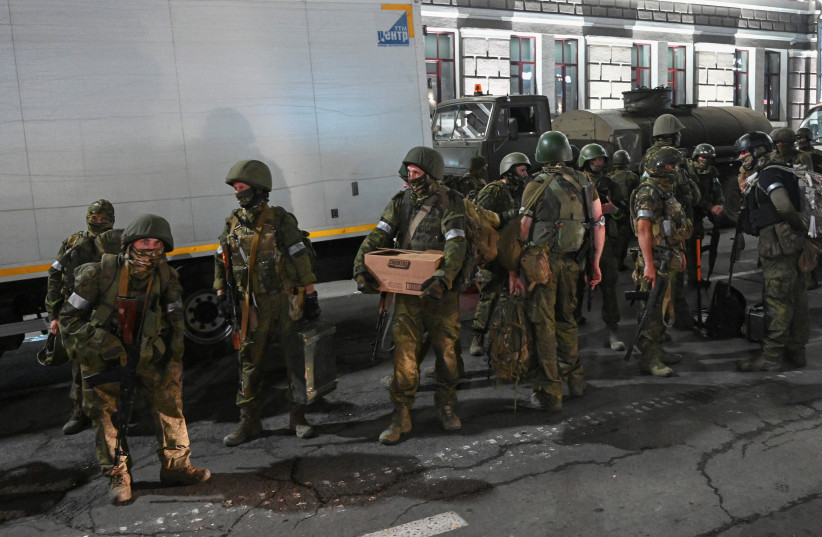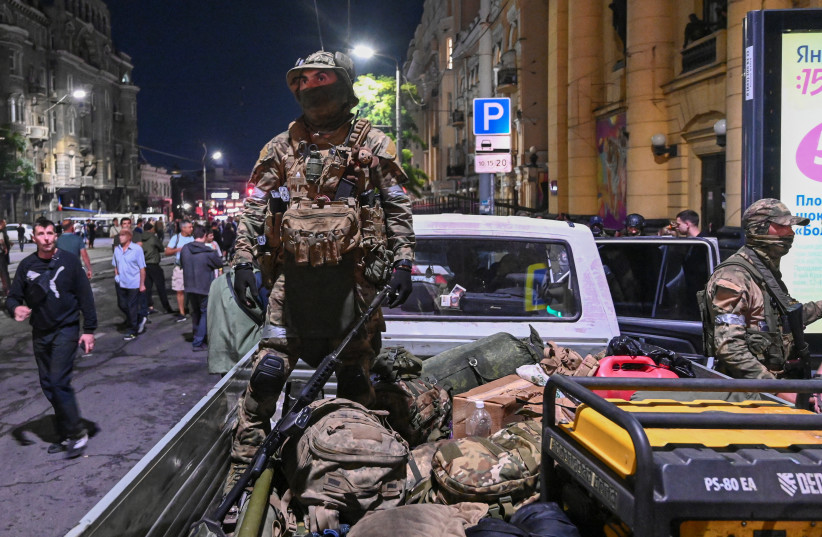Heavily armed Russian mercenaries pulled out of the southern Russian city of Rostov overnight after halting their advance on Moscow under a deal that defused an unprecedented challenge to the authority of President Vladimir Putin.
Under the deal, mediated by Belarusian President Alexander Lukashenko, fighters of the Wagner group would return to base in return for guarantees for their safety and their leader, Yevgeny Prigozhin, would move to Belarus.
However, the aborted mutiny raises big questions about Putin's grip on a country he has ruled with an iron hand for more than two decades. Italy's foreign minister, echoing other analysts, said it had shattered the "myth" of Russian unity.
Prigozhin, a former Putin ally, whose forces fought the bloodiest battles of the 16-month war in Ukraine, said his decision to advance on Moscow was intended to remove corrupt and incompetent Russian commanders he blames for botching the war.
He was seen leaving the district military headquarters in Rostov - hundreds of miles south of Moscow - late on Saturday in a sport utility vehicle but his whereabouts on Sunday were not immediately clear.

"In 24 hours we got to within 200 km of Moscow. In this time we did not spill a single drop of our fighters' blood," Prigozhin, dressed in full combat uniform at an undisclosed location, said in a video earlier in the evening.
"Understanding ... that Russian blood will be spilled on one side, we are turning our columns around and going back to field camps as planned."
After capturing Rostov - the main rear logistical hub for Russia's invasion of Ukraine - the mercenaries had raced north on Saturday in what Prigozhin called a "march for justice," transporting tanks and armored trucks and smashing through barricades set up to stop them, video showed.
Moscow had told residents to stay indoors and deployed soldiers in preparation for the arrival of the mercenaries, who appeared to meet little pushback from the regular armed forces.
The capital was calm on Sunday, following the deal to de-escalate, with little evidence of increased security in the streets. Monday has been declared a non-working day to allow time for things to settle.
The Wagner departure from Rostov
Videos shared on social media from Rostov overnight purportedly showed the mercenaries withdrawing from the city in a convoy of armored vehicles, tanks and coaches to the sound of cheers and celebratory gunfire from local residents.
"Take care of yourselves," shouted one woman.
Reuters was able to verify the location of the video but not the date that it was filmed.
All transport restrictions in the Rostov region have now been lifted, Interfax quoted local officials as saying on Sunday.
Separately, Alexander Gusev, governor of Russia's Voronezh region to the north of Rostov, said on Telegram: "The movement of units of the Wagner PMC through the Voronezh region is coming to an end. It proceeds normally and without excesses.
Under the deal brokered late on Saturday, Kremlin spokesman Dmitry Peskov said a criminal case opened against Prigozhin for armed mutiny would be dropped, Prigozhin would move to Belarus, and Wagner fighters who rallied to his cause would face no action, in recognition of their previous service to Russia.
Peskov said Lukashenko had offered to mediate, with Putin's approval, because he had known Prigozhin personally for around 20 years.
In a televised address during Saturday's drama, Putin said the rebellion put Russia's very existence under threat.
"We are fighting for the lives and security of our people, for our sovereignty and independence, for the right to remain Russia, a state with a thousand-year history," Putin said, vowing punishment for those behind "an armed insurrection" and drawing parallels with the chaos of 1917 that had led to the Bolshevik revolution.
Peskov declined to say whether any concessions were made to Prigozhin, other than guarantees of safety for him - something he said Putin gave his word to vouch for - and for Prigozhin's men, to persuade him to withdraw all his forces.
Italy's Foreign Minister Antonio Tajani said in an interview with Italian newspaper Il Messaggero published on Sunday that Putin had created the conditions for Saturday's events by allowing Prigozhin over many years to build up such a formidable private army that then did much of the heavy fighting in Ukraine.
"The myth of the unity of Putin's Russia is over. This internal escalation divides the Russian military deployment. It's the inevitable outcome when you support and finance a legion of mercenaries," Tarjani wrote.
"One thing is certain: the Russian front is weaker than yesterday. I hope that peace will now be closer. We wait to see Russia's next moves in Ukraine."

The timing of the short-lived rebellion worked in Ukraine's favor
The revolt by Prigozhin came just weeks into the start of Ukraine's strongest counteroffensive drive since Moscow's invasion in February last year.
Ukrainian President Volodymyr Zelenskiy said on Saturday the developments, which sparked a flurry of high-level calls between Western leaders, exposed turmoil at the heart of Russia.
"Today the world can see that the masters of Russia control nothing. And that means nothing. Simply complete chaos," Zelenskiy said in his nightly video address.
The fighters led by Prigozhin, a former convict, include thousands of ex-prisoners recruited from Russian jails.
He railed for months against the military's top brass, especially Defence Minister Sergei Shoigu and the chief of the general staff, Valery Gerasimov, accusing them of incompetence and of withholding ammunition from his fighters.
This month, he defied orders to sign a contract placing his troops under the command of the Defence Ministry.
He launched the apparent mutiny on Friday after alleging that the military had killed many of his fighters in an air strike. The Defence Ministry denied this.
